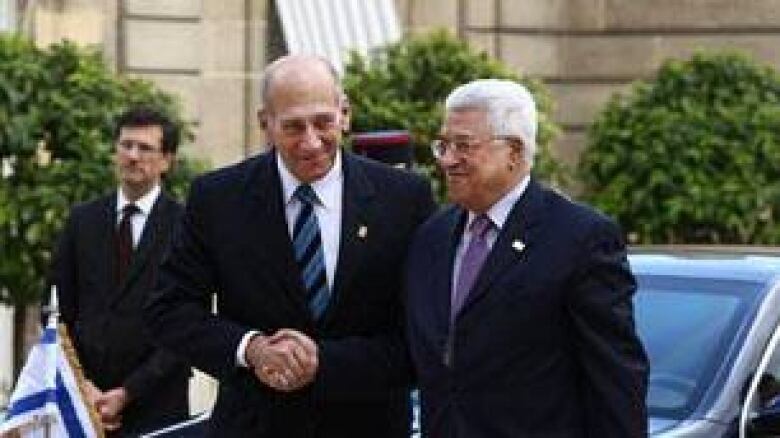Israel's first career politician

In the hours after Ariel Sharon suffered a massive stroke on Jan. 4, 2006, his powers as prime minister were transferred to his deputy, Ehud Olmert, a little known name outside Israel.
The first Israeli leader not to have a lengthy and illustrious military career, Olmert would go on over the next two and a half years to complete the Israeli withdrawal from the Gaza Strip, face off against a new and more hardened opponent in the Palestinian group Hamas and lead Israel into a short and desultory war with Hezbollah in Lebanon.
At Washington's very strong urging, he also threw himself into another round of high-level peace talks with Palestinian Leader Mahmoud Abbas, all of which is now up in the air.
Dogged by a long-running corruption investigation stemming from when he was the mayor of Jerusalem in the late 1990s, Olmert announced he would not stand for re-election when his party chooses a new leader in September 2008.
His stature in the eyes of ordinary Israelis and his own party appears to have been severely damaged by testimony at an Israeli court that portrayed Olmert as a bon vivant with a penchant for fancy hotels, cigars, expensive watches and first-class travel.
A career politician
A lawyer and career politician, Olmert graduated from the Hebrew University of Jerusalem with degrees in psychology, philosophy and law. He served in the Israeli defence forces as a combat infantry unit officer, and was also the military correspondent for the IDF journal Bamachane.
Olmert had a brief but reportedly successful law practice before he went into politics at age 28. He won a seat in the Knesset in 1973 — and was re-elected six times.
In 1993, he began a 10-year tenure as mayor of Jerusalem, where he spearheaded improvements to public transit and focused on improving the education system.
EHUD OLMERT
- Born: Sept. 30, 1945, Binyamina, Israel
- Married, four children
- Occupation: Lawyer, municipal politician
- Education: B.A. & LL.B., Psychology, Philosophy & Law, Hebrew University of Jerusalem
- Military service: Golani, IDF combat infantry unit officer Correspondent for Israeli Defence magazine Bamachane
He also became one of the key proponents of the controversial security barrier that was designed to prevent suicide bombers from entering Israel.
"This is a legitimate measure that we are entitled to use in order to defend our people," he told the CBC's Evan Solomon in an interview in October 2004. "Now, if the Palestinians want that this security fence will not be built, they can decide in a very simple way by stopping terror. If they will stop terror, there will not be a fence."
Political career
In his political career, it has been said that Olmert did not so much fight as followed his way to the top.
When Olmert returned to the Knesset in 2003, it was as Sharon's closest ally. He served as head of Likud's campaign in the 2003 election and was the chief negotiator for the party in the talks that led to the coalition government that emerged.
Sharon rewarded him by naming him deputy prime minister, and minister of industry, trade and labour. Olmert was by Sharon's side as the prime minister forged ahead with his plan to pull troops and settlements from the Gaza Strip. That policy exacerbated a split in the party and ultimately led Sharon to quit Likud to form a new, centrist party – Kadima. Olmert was one of the first to join Sharon.
As Sharon lay in a coma following his second stroke in less than a month, a poll on Jan. 11 showed support for Kadima was up and, of all the leaders, Olmert was seen as the most suitable choice for Israel’s next prime minister.
Three days earlier, as Sharon’s chair sat empty at the cabinet table, Olmert played to it openly at the first cabinet he led. "Sharon," he told the ministers, "would have told us to carry on, to safeguard Israel's economy and security."
In the March 28 elections, Olmert led Kadima to a narrow victory. In an election night speech, he pledged to consult with the Palestinians. But failing some agreement, he made it clear his government would unilaterally set its own borders.
"We will not wait forever," Olmert said. "The time has come to act."